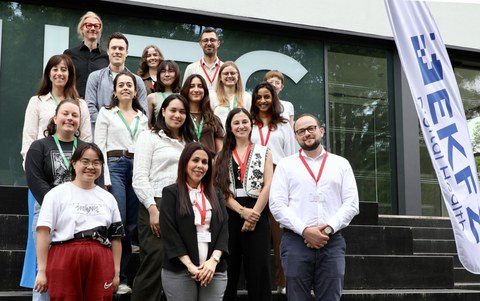12.06.2025
Femtech, Ethics & Innovation: Highlights der HALL-EKFZ Summer School 2025
Mit dem wachsenden globalen Bewusstsein für gesundheitliche Ungleichheiten rückt ein Bereich zunehmend in den Fokus: Femtech – das Zusammenspiel von Technologie und Frauengesundheit. Obwohl Frauen die Hälfte der Weltbevölkerung ausmachen, ist ihre Gesundheit in der medizinischen Forschung, Produktentwicklung und digitalen Gesundheitsversorgung nach wie vor unterrepräsentiert. Femtech adressiert Themen von Reproduktionsgesundheit bis Menopause und bietet nicht nur Raum für technologische Innovation, sondern auch für gesellschaftlichen Wandel, Gleichberechtigung und Empowerment. Um dieses Potenzial zu realisieren, gilt es jedoch, komplexe ethische, rechtliche und regulatorische Rahmenbedingungen zu berücksichtigen.
Vom 2. bis 6. Juni 2025 veranstalteten das EKFZ für Digitale Gesundheit und das BRU Ageing Lab gemeinsam mit der HALL University eine internationale Summer School unter dem Titel:
„Femtech Meets Law: Advancing Women's Health Across All Ages Through Technology, Regulation, and Ethics“.
Eine Woche voller Impulse
Die Veranstaltung startete mit einer herzlichen Begrüßung durch die Organisator:innen und einem aufrüttelnden Keynote-Vortrag von Dr. Andrea Biasiucci, die den „Innovationsrückstand“ in der Menopausenversorgung kritisch beleuchtete – und aufzeigte, wie Regulierung auch als Motor für Fortschritt wirken kann.
In Vorträgen, Workshops und Fallstudien widmeten sich die Teilnehmenden über fünf Tage hinweg zentralen Themen wie:
-
KI und Cybersicherheit in Femtech (Dr. Liqaa Nawaf)
-
Regulatorische Pfade und Innovationsstrategien (Dr. Vera Rödel, Karolina Magnusson)
-
Digitale Gesundheit und globale Gerechtigkeit (Dr. Christiane Hagel, Tigest Tamrat, Shada Al Salamah)
-
Femtech-Politik und Daten-Governance (Lauren Tonti, Cécile van der Heijden, Prof. Paul Quinn)
Ein Höhepunkt war die Diskussion „Pathologisierung des Alterns“, bei der ein interdisziplinäres Panel darüber debattierte, wie gesellschaftliche Narrative und technische Entwicklungen das Erleben von Frauengesundheit im Alter prägen.
Engagement, Austausch und kreative Lösungen
Die Teilnehmenden waren nicht nur Zuhörende: In Teams entwickelten sie Lösungen für reale Herausforderungen im Bereich Femtech und präsentierten ihre Ergebnisse am letzten Tag der Summer School. Die Projektideen reichten von fairer KI und länderübergreifendem Datenzugang bis hin zu Strategien für unterversorgte Gesundheitsbedarfe.
Auch das Miteinander kam nicht zu kurz: Bei einer Stadtführung durch Dresden, einem gemeinsamen Abendessen und einer Wanderung zum Lingnerschloss konnten Kontakte geknüpft und vertieft werden.
Ausblick: Interdisziplinarität als Zukunftsperspektive
Die Summer School 2025 zeigte eindrucksvoll: Die Zukunft von Femtech liegt nicht allein in technologischer Innovation, sondern in der durchdachten Verbindung von Technik mit rechtlichen, ethischen und gesellschaftlichen Fragestellungen. Mit Veranstaltungen wie dieser gelingt es, die Diskussion um Frauengesundheit aktiv mitzugestalten – inklusiv, gerecht und zukunftsfähig.
Unser besonderer Dank gilt allen Vortragenden und Teilnehmenden sowie unserem Partner HALL University – für eine inspirierende Woche, die noch lange nachwirken wird.
Wir freuen uns auf eine Fortsetzung im nächsten Jahr!

